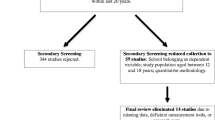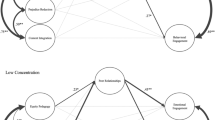Abstract
This study reports on the initial development and examination of the School Psychology Multicultural Competence Scale (SPMCS), a 45-item self-report measure for evaluating school psychologists’ multicultural competence in the primary domains of school psychology practice (i.e., assessment, consultation, intervention). A sample of 312 school psychology graduate students was recruited by outreach to school psychology training programs and email listservs to complete the SPMCS and a questionnaire about previous multicultural/diversity coursework and practicum with culturally and linguistically diverse clients. The results from principal axis factoring indicated that 28 of the 45 SPMCS items contributed to a four-factor solution with subscales identified as cultural skills, cultural knowledge, cultural appreciation, and cultural awareness. Internal consistency for each subscale was moderate to high. Overall, completion of multicultural/diversity courses and completion of practicum with culturally and linguistically diverse clients were associated with higher self-reported scores of multicultural competence. The SPMCS can potentially be used as one component to evaluate the extent to which training programs develop the multicultural competence of their trainees. Additionally, these findings provide additional insight into the conceptualization of multicultural competence.
Similar content being viewed by others
References
Allison, K. W., Echemendia, R. J., Crawford, I., & Robinson, W. L. (1996). Predicting cultural competence: implications for practice and training. Prof Psychol Res Pract, 27, 386–393. doi:10.1037/0735-7028.27.4.386.
American Psychological Association. (2013). Guidelines and principles for accreditation of programs in professional psychology. Washington: Author.
American Psychological Association. (2010). Ethical principles of psychologists and code of conduct. Washington: Author.
Arredondo, P., Topotek, R., Brown, S., Jones, J., Locke, D. C., Sanchez, J., & Stdler, H. (1996). Operationalization of the multicultural counseling competencies. J Multicult Couns Dev, 24, 42–78. doi:10.1002/j.2161-1912.1996.tb00288.x.
Carlson, M. H., Brack, C. J., Laygo, R., Cohen, R., & Kirkscey, M. (1998). An exploratory study of multicultural competence of counselors in training: support for experiential skills building. Clin Superv, 17, 75–87. doi:10.1300/J001v17n02_04.
Castillo, J. M., Curtis, M. J., Chappel, A., & Cunningham, J. (2011, February). School psychology 2010: results of the national membership study. Paper presented at the meeting of the National Association of School Psychologists, San Francisco, CA.
Constantine, M. G., & Yeh, C. J. (2001). Multicultural training, self-construals, and multicultural competencies of school counselors. Prof Sch Couns, 4, 202–207.
Curtis, M. J., Chesno Grier, J. E., & Hunley, S. A. (2004). The changing face of school psychology: trends in data and projections for the future. Sch Psychol Rev, 33, 49–66.
Dickson, G. L., & Jepsen, D. A. (2007). Multicultural training experiences as predictors of multicultural competencies: students’ perspectives. Couns Educ Superv, 47, 76–95. doi:10.1002/j.1556-6978.2007.tb00040.x.
Dickson, G. L., Jepsen, D. A., & Barbee, P. W. (2008). Exploring the relationships among multicultural training and experiences and attitudes toward diversity among counseling students. J Multicult Couns Dev, 36, 113–126. doi:10.1002/j.2161-1912.2008.tb00075.x.
Fagan, T. K. (2014). Trends in the history of school psychology in the United States. In P. Harrison & A. Thomas (Eds.), Best practices in school psychology. Bethesda: National Association of School Psychologists.
Gopaul-McNicol, S. (1997). A theoretical framework for training monolingual school psychologists to work with multilingual/multicultural children: an explanation of the major competencies. Psychol Sch, 34, 17–29. doi:10.1002/(SICI)1520-6807(199701)34:1<17::AID-PITS3>3.0.CO;2-S.
Hayton, J. C., Allen, D. G., & Scarpello, V. (2004). Factor retention decisions in exploratory factor analysis: a tutorial on parallel analysis. Organ Res Methods, 7, 191–205. doi:10.1177/1094428104263675.
Holcomb-McCoy, C. C. (2005). Investigating school counselors’ perceived multicultural competence. Prof Sch Couns, 8, 414–423.
Jones, J. M., Sander, J. B., & Booker, K. W. (2013). Multicultural competency building: practical solutions for training and evaluating student progress. Train Educ Prof Psychol, 7, 12–22. doi:10.1037/a0030880.
Lopez, E. C., & Rogers, M. R. (2001). Conceptualizing cross-cultural school psychology competencies. Sch Psychol Q, 16, 270–302. doi:10.1521/scpq.16.3.270.19889.
Malone, C. M. (2010). Evaluating multicultural competence in school psychology. NASP Communiqué, 38(7). Retrieved from http://www.nasponline.org/publications/periodicals/communique/issues/volume-38-issue-7/evaluating-multicultural-competence-in-school-psychology.
Malone, C. M., Connell, J. E., & Fiorello, C.A. (2011, February). The evaluation of multicultural competencies in school psychology. Paper presented at the annual convention of the National Association of School Psychologists, San Francisco, CA.
Murry, J. W., & Hammons, J. O. (1995). Delphi: a versatile methodology for conducting qualitative research. Rev High Educ, 18, 423–436.
National Association of School Psychologists. (2010a). Principles for Professional Ethics. Bethesda, MD: Author.
National Association of School Psychologists. (2010b). Standards for the graduate preparation of school psychologists. Bethesda, MD: Author.
Newell, M. L., Nastasi, B. K., Hatzichristou, C., Jones, J. M., Schanding, G. T., & Yetter, G. (2010). Evidence on multicultural training in school psychology: recommendations for future directions. Sch Psychol Q, 25, 249–278. doi:10.1037/a0021542.
Ponterotto, J. G., Rieger, B. P., Barrett, A., & Sparks, R. (1994). Assessing multicultural competence: a review of instrumentation. J Couns Dev, 72, 316–322. doi:10.1002/j.1556-6676.1994.tb00941.x.
Prus, J. P., & Garcia-Vazquez, E. (2014). Best practices in assessing performance in school psychology graduate programs. In P. Harrison & A. Thomas (Eds.), Best practices in school psychology. Bethesda: National Association of School Psychologists.
Rogers, M. R. (2006). Exemplary multicultural training in school psychology programs. Cult Divers Ethn Minor Psychol, 12, 115–133. doi:10.1037/1099-9809.12.1.115.
Rogers, M. R., Hoffman, M. A., & Wade, J. (1998). Notable multicultural training in APA-approved counseling psychology and school psychology programs. Cult Divers Ment Health, 4, 212–226. doi:10.1037/1099-9809.4.3.212.
Rogers, M. R., & Lopez, E. C. (2002). Identifying critical cross-cultural school psychology competencies. J Sch Psychol, 40, 115–141. doi:10.1016/S0022-4405(02)00093-6.
Rogers, M. R., & Ponterotto, J. G. (1997). Development of the multicultural school psychology counseling competency scale. Psychol Sch, 34, 211–217. doi:10.1002/(SICI)1520-6807(199707)34:3<211::AID-PITS3>3.0.CO;2-R.
Rowe, G., Wright, G., & Bolger, F. (1991). Delphi: a reevaluation of research and theory. Technol Forecast Soc Chang, 39, 235–251. doi:10.1016/0040-1625(91)90039-I.
Sammons, C. C., & Speight, S. L. (2008). A qualitative investigation of graduate-student changes associated with multicultural counseling courses. Couns Psychol, 36, 814–838. doi:10.1177/0011000008316036.
Smith, T. B., Constantine, M. G., Dunn, T. W., Dinehart, J. M., & Montoya, J. A. (2006). Multicultural education in the mental health professions: a meta-analytic review. J Couns Psychol, 53, 132–145. doi:10.1037/0022-0167.53.1.132.
Sue, D., Arredondo, P., & McDavis, R. (1992). Multicultural counseling competencies and standards: a call to the profession. J Couns Dev, 20, 64–88. doi:10.1002/j.2161-1912.1992.tb00563.x.
Sue, D. W., Bernier, J. E., Durran, A., Feinberg, L., Pederson, P., Smith, E. J., & Vasquez-Nuttall, E. (1982). Position paper: cross-cultural counseling competencies. Couns Psychol, 10, 45–52. doi:10.1177/0011000082102008.
Thomas, A. (1998). Directory of school psychology graduate programs. Bethesda: National Association of School Psychologists.
U.S. Census Bureau. (2012, December 12). U.S. Census Bureau Projections show a slower growing, older, more diverse nation a half century from now. Retrieved from http://www.census.gov/newsroom/releases/archives/population/cb12-243.html.
Vereen, L. G., Hill, N. R., & McNeal, D. T. (2008). Perceptions of multicultural counseling competency: integration of the curricular and the practical. J Ment Health Couns, 30, 226–236. doi:10.17744/mehc.30.3.g34u122m16q64g44.
Acknowledgments
This study served as Celeste M. Malone’s doctoral dissertation at Temple University. Special thank you to Catherine Fiorello, Joseph Ducette, and Frank Farley of Temple University; Erin Rotheram-Fuller of Arizona State University; and James Connell of Drexel University for their assistance.
Author information
Authors and Affiliations
Corresponding author
Ethics declarations
All procedures performed in this study involving human participants were in accordance with the ethical standards of the institutional and/or national research committee and with the 1964 Helsinki declaration and its later amendments or comparable ethical standards. Informed consent was obtained from all individual participants included in the study.
Conflict of interest
The authors declare that they have no competing interests.
Rights and permissions
About this article
Cite this article
Malone, C.M., Briggs, C., Ricks, E. et al. Development and Initial Examination of the School Psychology Multicultural Competence Scale. Contemp School Psychol 20, 230–239 (2016). https://doi.org/10.1007/s40688-015-0079-1
Published:
Issue Date:
DOI: https://doi.org/10.1007/s40688-015-0079-1




